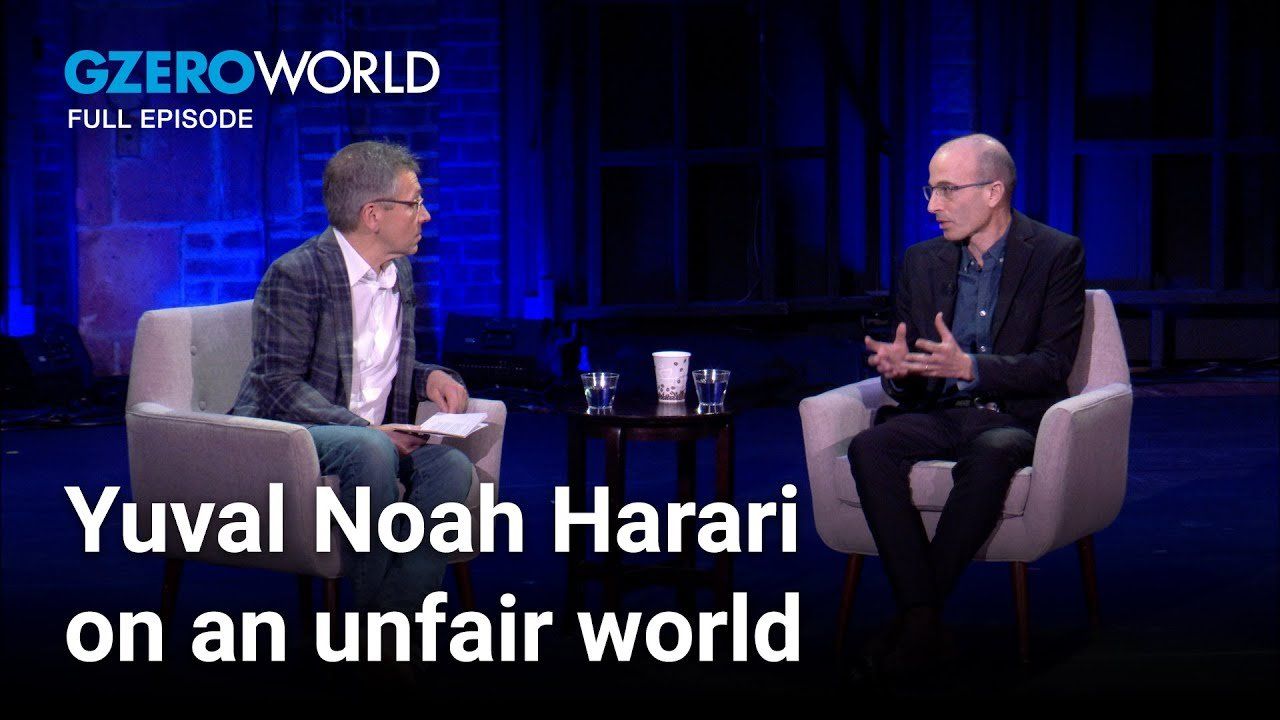March 11, 2024
In a wide-ranging conversation with Ian Bremmer, filmed live at the historic 92nd Street Y in NYC, bestselling author Yuval Noah Harari delves into the foundational role of storytelling in human civilization, the existential challenges posed by artificial intelligence, the geopolitical implications of the Ukraine war, and the most pressing questions of the Israeli-Palestinian conflict. Harari argues that unlike other species, humans have thrived on their unique ability to construct and believe in shared stories, which has underpinned the formation of societies, governments, and laws. However, this same capability has led to wars, inequality, and exploitation. “Humans don't fight over territory and food,” Harari tells Bremmer. They fight over imaginary stories in their minds."
Harari and Ian discuss the current global crises, including the wars in Ukraine and Gaza, as moments where humanity's collaborative superpower appears to falter. On the Ukraine war, he says that the implications of a Russian victory would spell the end of the global order as we know it. "We could already be in the midst of World War III that started on the 24th of February 2022 with the Russian invasion of Ukraine and we just don't know it yet."
They discuss AI's emerging role in creating and disseminating stories, which represents a new frontier. Harari warns that AI could eventually dominate the world's narratives, making democracy untenable and posing unprecedented challenges to both autocracies and democracies alike. "For the first time in history, we are losing power as a species at a very rapid pace, and similarly, we are also losing control of the stories that we believe."
He also specifically addresses the critical situation in Israel, criticizing government attempts to undermine democratic institutions and pointing to an ideological battle that risks altering the essence of Judaism and Israeli identity. Harari also stresses the importance of reconciling support for Palestinian rights with the defense of Israel's existence, challenging the narrative that these positions are inherently contradictory.
Catch GZERO World with Ian Bremmer every week online and on US public television. Check local listings.
From Your Site Articles
- Modern antisemitism on the rise ›
- The surprising history of disaster ›
- Why do Black people feel "erased" from American history? ›
- Why human beings are so easily fooled by AI, psychologist Steven Pinker explains ›
- Steven Pinker shares his "relentless optimism" about human progress ›
- From CRISPR to cloning: The science of new humans ›
- Yuval Noah Harari: Netanyahu's 'Deep State' fears enabled Oct 7 attack ›
- Israel, Hamas and US in impasse over cease-fire deal - GZERO Media ›
More For You
With close ties to both the US and China, can Singapore survive in an increasingly fragmented and chaotic world? Singapore’s President Tharman Shanmugaratnam joins Ian Bremmer on the GZERO World Podcast.
Most Popular
Think you know what's going on around the world? Here's your chance to prove it.
UK Prime Minister Keir Starmer shakes hands with Chinese President Xi Jinping, ahead of a bilateral meeting in Beijing, China, on January 29, 2026.
Carl Court/Pool via REUTERS
This week, Prime Minister Keir Starmer became the first UK leader to visit China in eight years. His goal was clear: build closer trade ties with Beijing.
Igmel Tamayo carries charcoal to sell on the side of a road for use as cooking fuel in homes, after US President Donald Trump vowed to stop Venezuelan oil and money from reaching the island as Cubans brace for worsening fuel shortages amid regular power outages, on the outskirts of Havana, Cuba, on January 12, 2026.
REUTERS/Norlys Perez
© 2025 GZERO Media. All Rights Reserved | A Eurasia Group media company.
